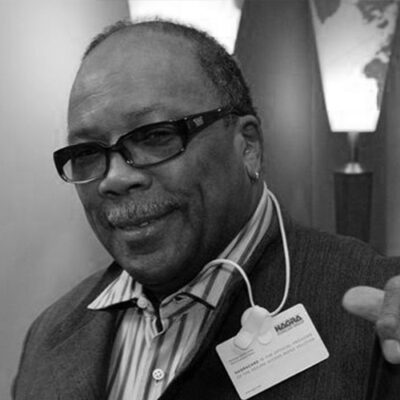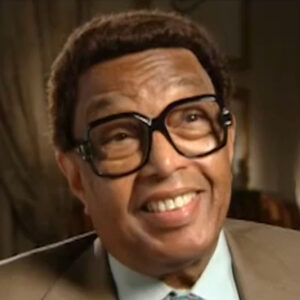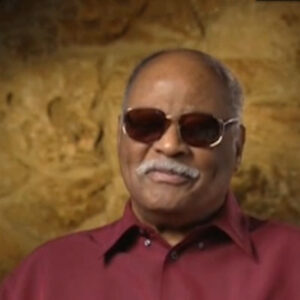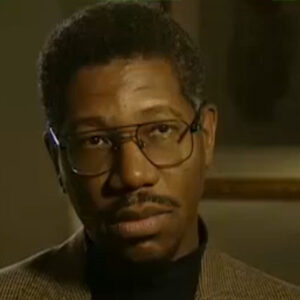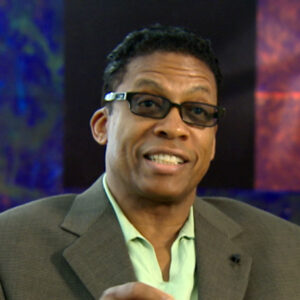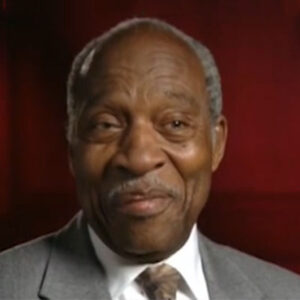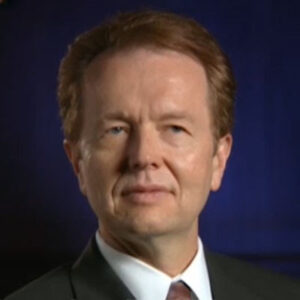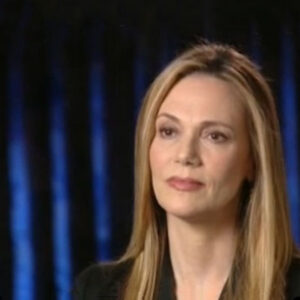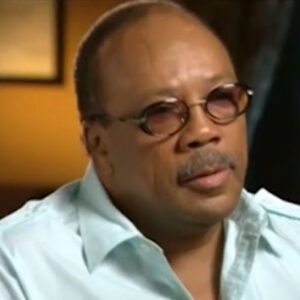Speaker Well, you know, I think like everybody else, when you’re around and about, meeting Quincy Jones happens in many ways, whether it’s eye contact and front my case. I think like most people, you meet Quincy Jones through his work. You’re you’re a witness, a Quincy Jones. You’re an appreciator of Quincy Jones. And our worlds overlap just by virtue of being brown and America being of cultural interest in America. My family before me and and everything. And I think that once I moved to Los Angeles, our paths crossed again. And as people know, he was the executive producer of Roots. My godfather, Alex Haley is the author of Roots. And, of course, also the author of the autobiography of Malcolm X. So both our worlds together once again. And I just think that just being in his atmosphere. And he’s one of those persons who watches you long before, you know, he’s taken notice. And by the time he kind of.
Speaker Engaged me. There are a number of characteristics I realized that he had recognized and we became like brother and sister very quickly, very potently.
Speaker When you first met him first, you were invited to a dinners. What’s the first impression you get him just as a person?
Speaker I think most people that are in the atmosphere of Quincy Jones feel like a welcome guest, despite his celebrity status, despite his range of success. He’s an approachable, inviting person who always makes you feel as if you are able to sit at his table, enter his home. He’s a very engaging, warm person. And as you get to know him, you develop some kind of interactive crush because the passion, the depth of passion that he has, he shares with you openly and kind of introduces you to your own depth, the passion.
Speaker Speak if you were to. My next question is a sense of social conscience.
Speaker Clearly is very interesting, political, social, all kinds of issues, people of the world. Hey, where are you connected with him on that? And B, where do you think that comes from? You just raise the microphone. All right. OK.
Speaker No.
Speaker So I guess the question is speak, if you would, to where quinsy social consciousness comes from and how you’ve experienced that.
Speaker Well, I don’t know if one can break down when speaking about Quincy Jones, who he is musically, socially, politically, without just recognizing that he’s just simply interested in people.
Speaker Hence it it will break down into all of those various categories. I don’t think his intent is to change policy, but affect lives. And he uses what he has as an ambassador, as a liaison, as an emissary to heal, move, inspire lives. If that incorporates a political process, he will direct someone who is proficient in that. But I think it’s not the politician of fame. I don’t think it’s just the social activists of him. I think it’s the ambassador on behalf of the wellness of people.
Speaker That’s great. In particular, you know, Africa seems. It seems to have a real connection to Africa. Why is that and. How does it. You’re probably. I know it was sparked by rumors.
Speaker Some people said then I would have to leave that to them. I don’t know.
Speaker I mean, between you and I. I mean, I don’t know. This is not something I really want. I want to kind of go for something more clearly. Well, there may be things that and that may trigger something, but I think the interest of yourself, the origins of yourself, will always ever present otherwise. His evolution in music early wouldn’t be what it is. So if she can speak to it because she was living with him at the time, like Lisette Darro, who could speak.
Speaker There’s a different kind to me. I could take a guess, but I don’t need it to contradict any of the 20 people you.
Speaker Yeah. Well, help us, if you would. Let’s roll tape now. What do you think? Maybe one of our employees fell off a little hot.
Speaker No, it’s just the angle. Yeah.
Speaker You know, in case in a topic sentence, it isn’t perfectly eloquent. We heard her story, the foundation for years. I have this videotape of you visiting South Africa set up. Well, what were you guys doing there? What were the experiences you had? How do you think that touches?
Speaker Well, you know, one of the things that I think Quincy Jones is famous for is making dreams come true reality. So a hunch and a notion and a statement was realized when we all has a caravan went into South Africa, August 19, August of 2000.
Speaker And I as I understand it, when Nelson Mandela turned 80 years old and Quincy Jones and family were present, he had promised him as a birthday present that he, on behalf of the Quincy Jones Listen Up foundation, would build 100 homes upon his return. We started to pull together the theme or the titles from South Africa, from South Central to South Africa and assembled young people from the South Africa.
Speaker The no, just refrain. Well, just got to know quite a few of them as real gangbangers.
Speaker They’re not, you know, I think the drama.
Speaker But you didn’t refer to it.
Speaker It’s just easier if we go to for you and come back. It feels a little bit different. You were better.
Speaker I need to reframe it because you ask. You said we went from one place and then said you’ve brought up some what? But the question was, question is just a setup.
Speaker What were you doing in Africa and what did it mean to Quincy?
Speaker Do you want to beginning from that?
Speaker Because you said that you started saying something about if we’re weaving you in with Lisette Daro.
Speaker No, no, that’s okay. I know she’s going to speak. She’s going to speak largely to it. But if you don’t have to give you a beginning or root. Okay. Just, you know, August of last year, we went to Africa. Okay.
Speaker Thanks. So. OK, you’re all good.
Speaker August of the year 2000 and a caravan of members on behalf of the Quincy Jones Listen Up foundation went over to a long awaited trip to Johannesburg, South Africa, along with five selected young persons from South Central Los Angeles. After interviewing about 30 young people, all of whom were amazing young people, and I recalled the interview process being very difficult.
Speaker But we had a limit that we could take. And we get that these young people and another couple of organizations, ANSA and CAA members, to go over and build the first few homes in conjunction with Habitat for Humanity as a promise that Quincy Jones made for Nelson Mandela on his 80th birthday. And that’s the beginning of our theme, building homes from South Central to South Africa. And our intent is to eventually move across the globe using those two points as a conceptual point across the globe and uniting young people, assisting one another, like in my day when you had Peace Corps in those kinds of things, enabling these young people to know about conditions of lives around the world, people their age. And I know it was absolutely remarkable.
Speaker And I think the most significant thing for me when I went to South Africa was in addition to being in the atmosphere of Nelson Mandela, was knowing that eight years, nine years prior that apartheid existed and watching the interaction of cross culture, trying to rebuild the spirit in the grounds of a heritage of a country. And it made me wonder, with all of the opportunities we have here in the United States, why we’re moving so slowly and they’re managing to do that, not without challenge, but the spirit of hope. The spirit of.
Speaker Will was very much one of the things that we as adults, as well as the young people who thought that their lives were challenged here. Our young American kids from the urban environment. Once they realized what it was like someplace else, which I think is a lesson for most Americans to know what our opportunities are here. And so they become our first young ambassadors on behalf of the voice of the Listen Up Foundation.
Speaker Right now, there was this scenes of sort of singing that Quincy was caught up in. What was that?
Speaker I can’t go ahead.
Speaker Finish your question that was asked.
Speaker There are these scenes where, you know, first we were chanting Quincy and then we were dancing. What was that about?
Speaker First of all, if anyone says that, you know, the rhythm in the soul is in the root of the African continent, I don’t know what, regardless of the hue of that, the tone, the skin of the person from the moment we landed. There was joy and things moved melodically. And it seemed that wherever we were coming out of it, exiting a bus home or entering a home or a township, that one home would turn into a chorus that seemed to have lift everyone’s spirits. No matter what the circumstance was, and they could take a simple word like Quincy and turn it into things and language in that language. I don’t understand. But you could play the spirit. You can feel the joy. And when you think about the fact that they don’t have C.D. players and infrastructures that they can plug and things and and MTV and VH one and all of that, we knew that they knew who he was by what he shares of himself, that he was a repeat visitor and that by word of mouth, by Pony Express, by, you know, that method, the original organic method of communicating that he and his spirit and his soul and his frequent visits and his contribution resonates wherever he is. I mean, we know it here in the United States, but certainly in the townships, they would all gather waiting for this person who they highly, warmly respected.
Speaker And doesn’t the same exact thing happened with Quincy when he goes to an economic conference? You know, it’s not just in that scenario I saw I saw in Paris a French hero.
Speaker So tell me about that.
Speaker When one comes into the atmosphere of Quincy Jones. His heart is accessible. So even if you have a frown on your face, it has no place in his atmosphere. He doesn’t engage it. He’ll warm it up. He’ll give you a wink, a pat on the back or something that in that moment removes the frown or the ache. He has the capacity to do that. I know, because whatever might seem to be a justifiable melancholy subject, he’ll turn it around. And so I think as a result of that and being consistent with it and a risk taker and a dreamer and a planner and a visionary with the intent of making things happen. He wherever he goes, you have to move it around. Some people may not even like that. But he doesn’t even give that any negative time.
Speaker Have you ever brought him some problem, which is just a really big problem? He somehow took that attitude that. Can you personalize that idea in terms of any of this stuff?
Speaker I mean, for me, it’s I mean, I’m with him all the time so that I don’t think of things as problems. I one of the things that I know is as a friend, as a sister, as a collaborator, sharing on his board, manning one of his companies, there’s a lot of interaction and you get a human response no matter what. And if there’s a problem, you almost work it out before you approach him with it, because if you’ve been around him long enough, you know that there’s a remedy. So it makes you fast forward to what those remedies could be. And then you present to him the options and those remedies. So he has that kind of effect. You cannot bring him as nonsensical, irrevocable problems. That really is a waste of time for a person is very busy. No one but a person who is a perpetual optimist even admits struggle. I’ve been around him when he has lost family members. It’s painful and you have to leave room for him to heal and offer him the hug that you know, he always makes available for everyone else.
Speaker Can you see the link between Quincy is the young mother was teen in Chicago and the teenagers? He’s so interesting. Sidney Poitier this morning said there’s a part of Quincy that’s still is and will always be St.
Speaker I think that we are always who we are and sometimes those things aren’t realized until we’re put to task. And I think because of the extremes of the life.
Speaker Experiences that Quincy Jones has experienced both both this early beginnings and his mother being taken from them as children and his father raising them all the way to being absolutely embraced by every other mother across the globe.
Speaker There is nothing that ever fulfills.
Speaker The absence of mommy, the absence of daddy, although he leaves room to smile and he accepts every love. And he’s one of the most deep lovers I think I’ve been around. I mean, the large capacity to love, despite where his aches and his pains will last also forever. I don’t think that there is enough wealth, success and access that can replace.
Speaker The lullabye missing. From a child who is not laptop. His or her own mother in the early days.
Speaker And I think that’s why he is able to feel so much. I don’t think it’s the lack of wealth in his childhood. I don’t think children who don’t have no that they don’t have. But there is a sense of imbalance if key people are missing. And. Instead of going the route, others have gone when they don’t feel love. He obviously recognized what love was. What love is because he’s claimed it and he gives it away.
Speaker Enormous success, not just in music, but he breaks down barriers, breaks with traditions, sees his own vision.
Speaker Can you speak to, say, in global drums, the offices in which we’re sitting here in or in your other experiences, how he sees ahead? There really doesn’t care about categories at all. His whole thing is like it’s not jazz, it’s good music, you know, or whatever it is. So I guess that’s a broader question. How did the a interesting break down categories be different question? How can you see the future?
Speaker Well, I think most people don’t have the gift of seeing the future future and having a hunch and a notion and an idea and an impulse and a desire. Most people say, no, we’re afraid to venture. When you say no, I don’t think that can work. Or maybe that’s too convoluted to Quincy Jones. It really does make him move further in the direction. And there are a lot of people that are like that. You say, no, can’t. And they say, yeah, but I feel it. I feel it. I see it. I know it. I don’t know how we’re gonna get there. But I’m already feeling myself in the atmosphere of the realization of whatever that whatever that is, that’s what’s really great for me around him, because I think people that are like that are a bit of an enigma because they have to do it even when the people in their atmosphere don’t have faith. So a person like Quincy Jones is an inspirer for persons, blah, blah? No.
Speaker So it’s I did, you know.
Speaker Well, do you think that with women’s egos refused to take no for an answer?
Speaker Well, I don’t know where he says. I just the question, when few places start with global drops, you’re working on something.
Speaker I mean, what facility? And we’ve got so little like that. How would you describe the terms?
Speaker You did it beautifully to me when we walked in. Did I say it? Yeah, I did.
Speaker It’s.
Speaker Global subdivision of this one is considered. It’s a company that develops content, radio and television.
Speaker That’s it. That’s what it is.
Speaker If I put this head on her, not good. Yes. OK. So you’re actually working with Wednesday night.
Speaker What are you working with on him? Directly from your friend?
Speaker Global Drums, Inc. It’s a quote, another Quincy Jones company that I am proud to be the president of.
Speaker And as he worded it a couple of years ago, he really wanted there to be something pull together that united or shared the rhythms of the African continent and the diaspora and its real effect and influence over the world, the music, the culture, the origins, the sophistication, you know, images and things that we just do not have a sense of. And the joy, the tradition. And so what we’re doing now and global drums is developing content and programming for whatever the mediums may be. Television and satellite radio, as well as ground radio, are the new mediums as well as Internet. Whatever the medium is, it is making sure we utilize the beauty of world music in the broad sense, in the broad sense. People haven’t a clue about that. For those of us who are cultural hobbyists, we cannot wait to share. It was a natural part of me and certainly that of him. And somebody asked me what I do, that there was no beat between him asking in my saying yes. I think the difficulty is until people know that what is part of the world is also part of them. I think generally there’s America. And then there’s the rest of the world. And so when I’ve had conversations with people, they see world music and American music as if we’re not part of the world. So that has been an interesting kind of massage and sharing with people that the beat that you hear in Brazil to the beat that you hear in Istanbul. But they beat that two here in Sri Lanka as well as England. Has a place in your life and most places outside of the country, music really is a part of celebration and mourning. It’s inclusive. And so with global drum, my interest is to make the anthropology of it in the entertainment of it merge.
Speaker What its currency share with Nelson Mandela.
Speaker I would think while people probably would not compare the two. Quincy Jones and Nelson Mandela both. Ah, men of peace. Men of foresight. Men of will. Men of stamina and whom are brilliantly strategic. People would gather that men who are gentle.
Speaker Have minimized some aspect of this strength and conviction. But there’s no way that either one of them could be who they are without the courage to move and forge ahead, despite the odds.
Speaker And I think that they are characteristically alike. And when people who are unique or odd find one another, regardless of the language, regardless of the path, when you’re in the same room, you know that you are like souls. Quincy Jones and Nelson Mandela have paralleling spirits.
Speaker Well, thank you. Here’s a here’s a question that just occurred to me in terms of I think Quincy and leaders and.
Speaker Do you think Quincy shares any in his autobiography, he wrote that you met your father when he was Detroit Red and he. I don’t remember the exact line, but he greatly admired his perspective. What do you think he shares with your father in the same light?
Speaker And I’d ask because it wouldn’t be readily apparent unless we put on the thing you mentioned of your father.
Speaker So what do I say? Just say I think Quincy shares my father name rather than us having a title, which is. Tell us. All right. That might be it.
Speaker Let me just figure out how to get into that. I mean, I did mention that Alex Haley wrote the autobiography. I just meant to use a different item or just start with Megamix, my dad. But did you grow back? No, no.
Speaker But I feel it’s really I have this vision of Quincy because next week we’re interviewing Bill Clinton. And I was in France and that was Jacques Chirac. And he’s with Mandela. He is a world’s leader. He has a stature that in any way that I can help to either place by analogy differences the same perfect time.
Speaker He’s he’s like this, but he’s different here.
Speaker It helps people understand that he’s not either a trumpeter. I think you could really miss this level. Really?
Speaker Well, you know, when he met Mike, when he says that he met my father, my father was in the music world. So it wasn’t and it wasn’t as Malcolm X.
Speaker And so I don’t know at what point. I mean, this is this is I don’t know this man. Yeah. Because this is I’m just trying to work.
Speaker What’s he also wrote his autobiography that your father was one of the greatest leaders and symbols of pride ever to emerge from black America. Who was your father? What does Quincy have in common?
Speaker Well, while talking about Quincy Jones can bring a smile. Certainly when I have the opportunity to speak about my father, it brings that child’s grin. Silver. Caused me to blush when people when I was growing up and people talked about Malcolm X depending on the company or the surrounding. Some smiled and some did not. I was fortunate to not only be his daughter, but to be a real part of his honesty. To witness the sculpturing. Of pride. And watching him love my mother openly interact with his children. So the way that my father engaged me. Give me something to live with. Despite how traumatic things may have been short of a decade and enables me to live with now and draw a blush. One of the things I think for me and how I zero in on special people is based on the special people in my childhood, my parents hand-picked really amazing people who stood for something. Quincy Jones is not only attractive and talented and successful in terms of photos and growing up in all of the things that people associated him with before knowing him, but when you get around him, he reminds me with some of those same components that I had in my childhood. If people who lived stood for something, all of whom were young, had no idea that they would make history or leave a mark, or that what they represented would make a difference in other people’s lives. My father left the earth at 39 years old, having no idea that as we enter the new millennium that his voice would resonate, that his heartbeat would be felt, that his smile would kind of be cherished and kind of a characteristic. Same time. Quincy Jones and others who are forging ahead to do and stand for something and use their own particular craft and medium similarities between men like Quincy Jones Mandela. Others whom have been long lasting friends in his life. I think it’s the one thing they all have in common is a real sense of their personal value humbly and that they had a responsibility to extend it. Openly.
Speaker We should quit now. I don’t think you can top that. It was like it was always that. That was cut. No.
Speaker So, Mike, my hatchet wasn’t cut as a beautiful expression by your father.
Speaker I love him.
Speaker Yeah. I wasn’t I. Thank you. That was great. My last question. How’s your leader? Oh, here we go. What kind of business, man? Because Quincy Jones.
Speaker Quincy Jones is one of the sharpest, quickest businessmen.
Speaker He does not miss a thing.
Speaker And you think he’s not listening because he’s giving you a soliloquy or an anecdote or a story that he’s experienced 20 years prior to the moment that you’re talking and hoping that he’s taking notes.
Speaker He’s recorded everything and he will sort it out and move it around. And by the time it comes out, there’s a plan.
Speaker Because we filmed him doing a Bite magazine thing, you know, just tangentially.
Speaker Here’s another broad question many people have said Quincy has the golden touch music, television, film, publishing, philanthropic efforts. What’s the secret?
Speaker I think the secret to his multiple successes and the varying arteries in which he ventures is the intent to succeed is he’s not trying to be busy, to be busy.
Speaker But he sees it and he has the intent to see it through.
Speaker And if he’s not the one to take it across the finish line, he will pass the baton to make sure that whoever has the legs and the strength to take it on the other side. Just to make sure that the intent is seen to its fullest. Do that.
Speaker That’s great, because his father used to tell him this is a paraphrase, you know, do a job and make sure it gets done. And that’s your right. He took that from his father.
Speaker I think everybody’s parents said that this is different.
Speaker He said, father, fatherhood every day.
Speaker You remember the phrase, never do a job unless you’re going to finish. All right.
Speaker What’s a foundation set of drums, man leader to attach strong interest in children?
Speaker That’s one of his wife’s questions. Good. Well, dare I say that? No, you didn’t say that.
Speaker I mean, it’s it’s children’s. It’s a question for someone else. I mean, for me, I just think he loves. I see him giggle over children and giggle over adults. He has. He will get a kick out of a person who has a characteristic is the only way they can get a kick out of her dog.
Speaker He’s he’s you know, so he’s really compassionate.
Speaker His interest in children, I think, is because he’s fragile. They’re fragile. And any one, I think he sees himself and most children the range of vulnerability, but also with the potential to do and be whatever one strives to be. And so since he is able he doesn’t have the desire. He knows that he is able to assist someone to the other side. And he utilizes all of those means to make sure that if that is your dream and it’s something he can do, he’ll assist you with it.
Speaker He’s very much a bad dream since he was 10 years old. Composer this dream. I think some people made like that. Last big question years from now. You know, not to pigeonhole him, but how should people how do you think people will remember in one hundred years hence?
Speaker I think for those. All of us who’ve come across Quincy Jones as Pat. The thought of him will often generate a smile. A warm feeling, you know, a funny story or a remembrance? Remember that time? Do you know what he said? I mean, there’s something he said that he put together. You always want to use one of his anecdotes to paint a picture. I think for the broader culture, internationally speaking. He is a representative of. If you desire it, claim it.
Speaker That’s great. I always ask people, you know. Because my questions are based on. This much kind of sense of things. Are there stories or song?
Speaker I mean, signature, which is that if you think that Quincy, you know, that’s about being in the White House and having to have a Z sneak across the hall when Clinton sex scandal, do you know about this? Because they’re not legally married. They weren’t allowed to stay in the same room at the White House. Staffers say, well, we can’t embarrass the president. Nice move situation. This is like while he’s being impeached.
Speaker Unbelievable. This assistant Quincy, quintessential Clinton story. But, you know, I just give you a minute. Throw it open. And, you know, again, maybe there’s one of those stories they shared with you. You know, I had a story where I said this photo shoot in.
Speaker They are sitting there waiting to interview Clinton. I can’t stop eating this pie. It’s being served. I don’t know what it is, but this pumpkin pie pop dad is here because it’s sweet potato pie.
Speaker It’s like this moment, no edge to migration. Let me just crack it.
Speaker But no matter what he always says in response. Yeah. Yeah.
Speaker But is there a moment that, you know, is for you that it doesn’t have to do with anything except for that moment where, you know, you had a flat tire or you. Misplace something.
Speaker You were at a concert or, you know, you’re with the World Economic Conference and here’s Bill Gates or I don’t know, the dirty Janatha.
Speaker I was just about to say there’s nothing I can say on camera right now. You said Sherry’s dirty, dirty Joe.
Speaker I don’t know what’s Fisher out for that stuff. That may not be a perfect one today, but there is.
Speaker I’ve lived with many of them, so I guess I can’t because he actually isn’t cooperating.
Speaker Every business meeting, even I mean, the range of how he tells the story. There’s no one place that he thinks is more appropriate, whether to use these kinds. He’s a storyteller.
Speaker He’s a storyteller. Whether through composition. Or verbal expression.
Speaker He’s a storyteller who likes to give props to all the different in the middle of story of stretching someone’s own songs. So, you know, they were all there with data.
Speaker No, no, not just there, but like a credentials and data, right. Yeah. Remarkable.
Speaker Let’s be careful and say that’s pretty much, you know, huge.
Speaker Now, these are the bad. This is so bad. It’s not that bad. I said something bad. Quincy names everyone in these particular way.
Speaker Well, in my own, I’m kind of like traditionally formal, you know, kind of raised around the protocols of various cultures in my childhood. So I am unable to call him either Quincy. Or anything like that. By his first name. So I called him sir. Q.
Speaker With all due respect that he deserves, and I didn’t I mean, I’ve always been teased about my voice and when I answer the phone.
Speaker Of course it’s. Is this raspy, you know, and like a musician, he’ll call you one 30 in the morning, which means that it’s raspy and tired.
Speaker And he said, oh, my God. Sounds like a crack house. Like, I’m sneaking. So he started, called me O.Z for outs, and then he narrowed it down to Z..
Speaker Since then, years later.
Speaker Fast forward. Lady Legacy. Is what he’ll call me in addition to this Chiffons.

